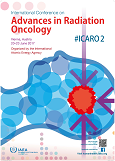Speaker
Hajer Kammoun
(Institut Salah Azaiez de Cancerologie, Tunis)
Description
Small cell lung cancer: A retrospective study of 70 cases
Background:
Small-cell lung carcinoma (SCLC) is an aggressive form of lung cancer. Therapeutic strategies are chemotherapy (CT), radiotherapy (RT) and supportive care. This study aims to investigate the clinicopathologic characteristics, therapy methods and prognosis of SCLC.
Methods:
We conducted a retrospective study of 70 cases of SCLC collected in the department of medical oncology of Salah Azaiz institute in Tunis over a period of 6 years (2008-2013)
Results:
The study population comprised 66 men and 4 women. The median age was 58 years. All patients were smokers. At presentation, the vast majority of patients were symptomatic. Pathological diagnosis was obtained essentially by the performance of bronchoscopic biopsy .It revealed a lung small cell neuroendocrine carcinoma .50℅ of tumors were immunoreactive for TTF-1 , 90℅ for keratin and 73℅ for EMA .Tumors cells stained positively for markers of neuroendocrine differentiation including chromogranin A , synaptophysin and CD56 . The disease was metastatic in 75℅ of cases. According to the VALCSG classification ,the tumor was staged as limited-stage disease in 15 cases and extensive-stage disease in 55 cases .13 patients received a curative –intent CT : 10 patients had induction CT before RT and 3 patients had concomitant radio-chemotherapy .Etoposide with cisplatin (EP) was the used regimen. The median overall survival (OS) in the limited-stage disease group was 16 months. 81℅ of patients with extensive-stage disease received palliative chemotherapy. The main regimens were EP, etoposide with carboplatin and CAV (cyclophosphamide, doxorubicin and vincristine). 17 patients received second line CT. Only 6 patients had third- line CT. A whole brain RT, thoracic RT, analgesic RT and RT of spinal cord compression were administrated in respectively 35℅, 28℅, 11 ℅ and 6℅ of cases. The median OS in this group was 9.3 months .91℅ of patients received morphine.30 ℅of patients were oxygen dependent. Evacuative thoracentesis was performed in 24 ℅of cases. The median overall survival of the study population was 10.32 months.
Conclusion:
Small cell lung cancer has poor prognosis. Developing prognosis biomarkers and experimenting new agents are needed to improve outcomes.
| Institution | Institut Salah Azaiez |
|---|---|
| Country | Tunisia |
Author
Hajer Kammoun
(Institut Salah Azaiez de Cancerologie, Tunis)

